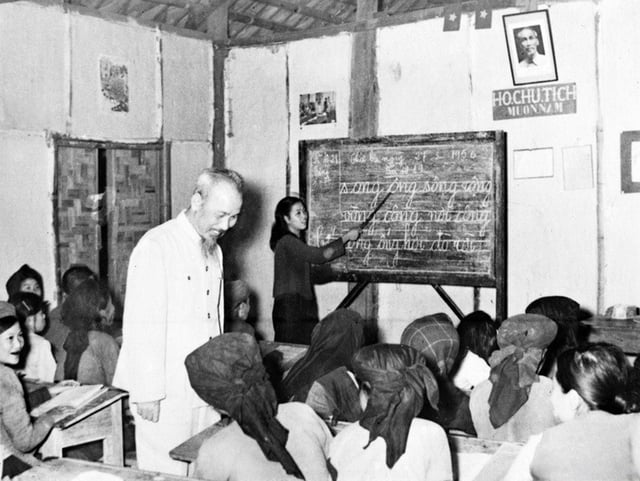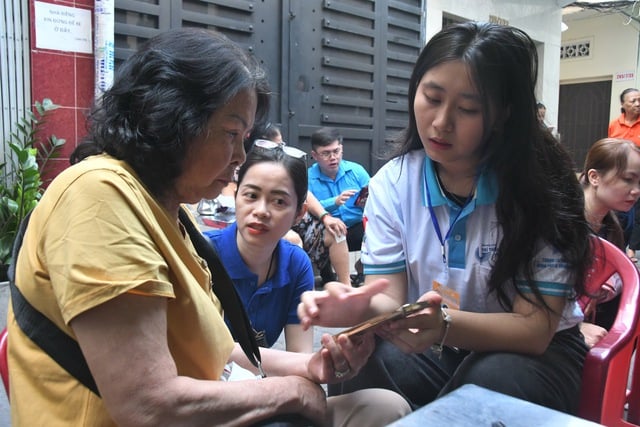Please understand that the concept of "digital literacy for the masses" does not refer to basic arithmetic like addition, subtraction, multiplication, and division as our grandparents learned 80 years ago. Here, it refers to "digitalization," a way to access and utilize the simplest skills to serve one's own life through the digital environment. General Secretary To Lam introduced this concept and also initiated it, marking a turning point in popularizing digital knowledge and skills, building a solid foundation for a digital society, digital economy , and digital citizens.

President Ho Chi Minh visits a literacy class for the people of Luong Yen area, Hanoi, on May 27, 1956.
Photo: VNA
The term "common language"
Looking back at documentary footage from 80 years ago about the literacy classes organized by the revolutionary government in almost every remote village and hamlet, one feels sorrow for the hardship and poverty our country endured. Back then, up to 95% of the population was illiterate, a heartbreaking figure. Therefore, immediately after the declaration of independence and the inauguration of the new government, President Ho Chi Minh, on September 3, 1945, proposed launching a campaign against illiteracy, because, according to President Ho Chi Minh: "An illiterate nation is a weak nation."
At that time, even though the entire country faced internal and external enemies, illiteracy was still considered one of the three enemies that needed to be eradicated, along with hunger, ignorance, and foreign invasion. "Popular literacy" classes were established with the principle of "literate people teaching illiterate people." Anyone who could read and write fluently was eligible to teach. The motto "those who are literate first teach those who are not" became a movement, yielding surprising results: Millions of people learned to read and write in just one year!

The Community Digital Transformation Team in Ho Chi Minh City supports and guides citizens in installing and using online public service applications.
Photo: Queen
During the day, they focused on fighting hunger by increasing production, and at night, they fought illiteracy, considering it a mandatory duty. Many people at that time devised ways to transform lessons into rhymes in the six-eight meter for easier memorization. This can be seen as a "lesson plan" for conveying literacy to students in the best way: O is round like a chicken egg / Ô wears a hat / Ơ is old and has a beard / OA (oa) are two different letters / A is different because of the added hook…
Because illiteracy was considered an "enemy," everyone felt compelled to "go to war" to eradicate it. However, not everyone was enthusiastic about learning to read and write, especially after a tiring day at work, only to have to attend classes late into the night. Many people skipped classes, but the authorities at the time had a solution. One common method was to string ropes across the roads leading to the markets. A rope was stretched across, like a barrier, with a large blackboard next to it. Those in charge of the barrier would write any word on the board; if the person being tested could read it, they were allowed to go to the market, otherwise they had to turn back. This method, though seemingly gentle, was nonetheless decisive because to get to the market, one had to be able to read, and there was no other way to learn to read than to diligently attend literacy classes.
Remove the "bottleneck".
Before discussing the highly topical issue of "popular education," let's recall the nation's long struggle over the past 80 years, simultaneously fighting foreign invaders and ensuring education for all citizens. Vietnam, despite being a developing country, achieved universal primary education very early on. Furthermore, many families spared no expense in ensuring their children received an education, understanding that only through education could they escape poverty.
Many people have overcome adversity to change their lives through what they learned in school. Many parents, even those from impoverished families struggling to make ends meet, insisted on sending their children to school. I once witnessed my cousin, wiping away tears, leading the last cow out of the barn to sell to a trader, using the money to pay the final year tuition for his child studying information technology at a university in Ho Chi Minh City.
"From tomorrow, my wife and I will have to use our shoulders to plow the fields instead of the oxen," my older brother said, and it broke my heart to hear him say that. But his greatest aspiration in life was to ensure his children would no longer have to work the fields, so he tried his best to provide them with an education. And indeed, my nephew did not disappoint his parents. Now, his monthly salary is enough to buy… two oxen (2,000 USD, equivalent to about 50 million VND). Nothing is more expensive than investing in education, but it is also the most visibly effective investment if one studies diligently.
Since the country's economic reforms, the economy has improved significantly, but education, especially tuition fees, remains a complex issue for many families, particularly those with large families. Witnessing mothers in rural areas struggling to make ends meet, yet still finding ways to pay their children's tuition fees each school year, one can see this as a major bottleneck that needs to be addressed. And now, a dream of many generations has come true: tuition fees will be waived for all public high school students starting from the 2025-2026 school year.
Towards "population"
As mentioned above, the Party and State leaders have made a groundbreaking decision: to waive tuition fees for primary and secondary education. It is estimated that the state budget will allocate 30,500 billion VND to this. This is a significant effort by the entire political system at a time when the country needs to invest in many large-scale national projects. However, without such a "catalyst," Vietnam would find it difficult to confidently move into the new era.
Along with tuition fee exemption, the reorganization of administrative boundaries and the operation of a two-tiered government system require each citizen to make their own efforts to adapt to concepts such as the digital society, digital economy, and digital citizenship. Without participating in "digital literacy" classes, as General Secretary To Lam has initiated, it's impossible to do anything related to the digital world. Simply put, transferring money via phone is impossible without knowing the necessary steps if the seller doesn't accept cash. Nowadays, carrying just a smartphone is sufficient because it integrates all the necessary documents, but users must also be "digitally literate" to use it proficiently. Officials at both levels of government, especially at the commune level, must quickly become "digitally literate" if they don't want to lose their positions.
From a country where 95% of the population was illiterate and constantly faced hunger, now everyone has enough food and clothing, everyone has access to education, and everyone has the opportunity to escape poverty and live happily!
Source: https://thanhnien.vn/binh-dan-hoc-vu-tu-chu-den-so-185250827220918889.htm







![[Photo] General Secretary To Lam presides over a meeting with the Editorial Teams to summarize 100 years of the Party's leadership of the Vietnamese revolution and 40 years of implementing the National Construction Program.](https://vphoto.vietnam.vn/thumb/1200x675/vietnam/resource/IMAGE/2026/03/04/1772601288977_a1-bnd-8134-7576-jpg.webp)





![[Photo] General Secretary To Lam presides over a meeting with the Editorial Teams to summarize 100 years of the Party's leadership of the Vietnamese revolution and 40 years of implementing the National Construction Program.](https://vphoto.vietnam.vn/thumb/402x226/vietnam/resource/IMAGE/2026/03/04/1772601288977_a1-bnd-8134-7576-jpg.webp)



































































































Comment (0)